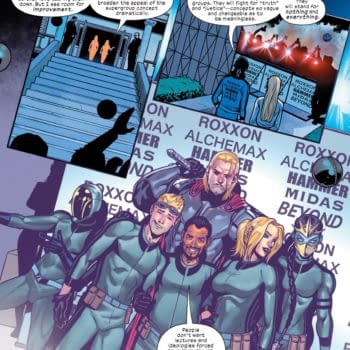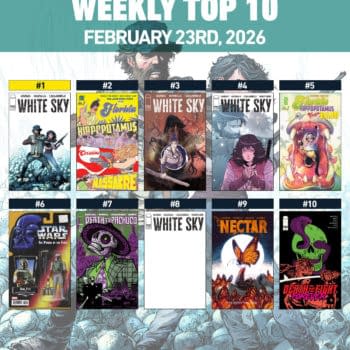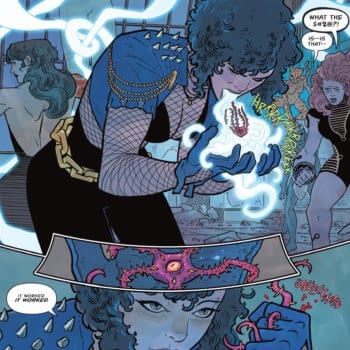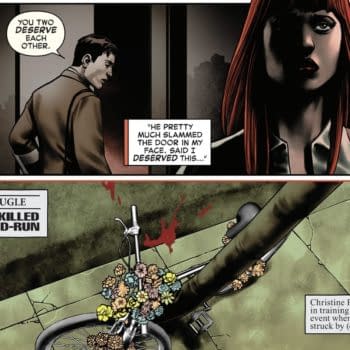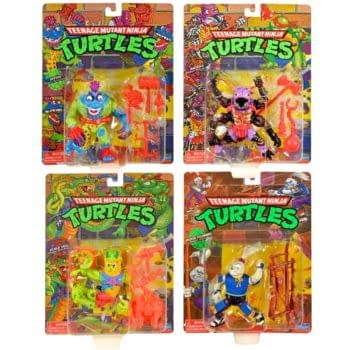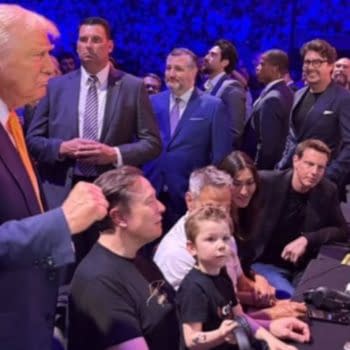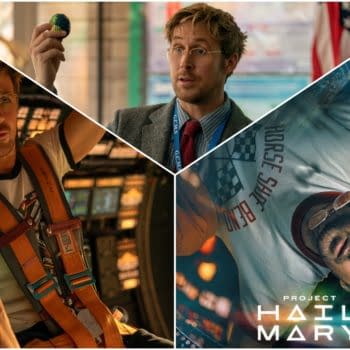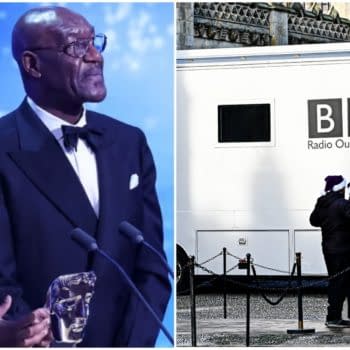Posted in: Movies | Tagged: film, grandmaster, ip man
The Many Movies Of Ip Man – Look! It Moves! by Adi Tantimedh
Adi Tantimedh writes;
So the US cut of Wong Kar Wai's The Grandmaster is doing well at the box office. Its main gimmick is that Ip Man was the man who taught Bruce Lee. It's only the fourth movie about Ip Man to come along since 2008, it's worth noting his worth as a cultural figure in modern Chinese history.
Ip Man was a grandmaster of Wing Chun, a defensive fighting form for close combat originally developed by a woman in the Qing Dynasty to take down a male opponent twice her size. It was introduced to Hong Kong in the 1950s when Ip Man moved there from China to avoid the Communist regime, since he had been an officer in the Kuomintang during the Second World War, and the new Chinese government did not treat the members of their political rivals' party kindly.
It's fitting that the Ip Man movies begin in 2008 with the new decade. Hong Kong movies in the 20th Century venerated the 19th Century master Wong Fei Hong in dozens of movies including Tsui Hark's movie series starring Jet Li. Apart from being Bruce Lee's teacher, Ip Man has the distinction of not only being ethnic Cantonese, but also of the 20th Century. The new movies position him as the link from 19th Century China to modern Hong Kong with a lineage that goes to Bruce Lee.
There are now five movies about Ip Man, all made by Hong Kong directors in what can be seen as their way of reclaiming him as one of their own. He may have been born in China, but he went to Hong Kong and made his mark on the world there. What's interesting is the way the movies use Ip Man as a figure to express different agendas. Each of the five movies to date is an example of how flexible fiction and genre can be for expressing different themes and ideas.
Wilson Yip and Donnie Yen's Ip Man (2008) and Ip Man 2 (2010) are fairly straightforward patriotic Kung Fu blockbusters with Yen's portrayal of the grandmaster as a paragon of virtue and Chinese masculinity against foreign – specifically the Japanese, British and Americans – comers out to humiliate China. These fights never happened in real life, but they went down a treat as visceral experiences for the audience, with a subtext of China reclaiming masculine power from past humiliations at the hands of foreigners. It was an empowerment fantasy as all martial arts movies are, but in this case it was also tailored to appeal to Mainland Chinese audiences just as the Chinese box office market was opening up to movies made by people not from China, a few years before Hollywood began to make their deals to get their movies into the Chinese market.
2010's The Legend is Born – Ip Man was a lower budget affair made by different producers, preferring a more straight, naturalistic biopic approach to the early life of Ip Man in China, serving chronologically as an unofficial prequel to the Donnie Yen movies. It was considered a schlocky cash-in to those movies, but had interesting moments before the genre demands of an all-out fight in the final act. Herman Yau, however, is not a director to easily dismiss, as you will read later.
The Grandmaster is probably the most upmarket and "prestigious" of the Ip Man movies, where Wong Kar Wai chose Ip Many to explore martial arts as a state of mind. I've written about the original Hong Kong cut a few months ago, and the US cut removes more than 20 minutes from the former's 130-minutes and reinstates footage left on the cutting room floor to create almost a different movie, more linear and less oblique than the Hong Kong version, and hammering too much on the fact that Ip Man trained Bruce Lee as if Americans are too stupid to pay any attention to the story otherwise. It does, however, retain the movie's dream-like take on a lost world in Chinese history and martial arts as a state of mind, a prism through which lost history is viewed, paying special attention to Ip Man's Cantonese heritage.
Where The Grandmaster is dream-like and impressionistic, Ip Man: The Final Fight is a naturalistic social drama, much more ambitious than the same director's earlier The Legend is Born – Ip Man. Released this year after The Grandmaster and unlike Wong Kar Wai's memory play, it's steeped in wide shots of meticulously-recreated post-War Hong Kong and details of social behaviour and mores of the time. The fights are filmed in real time with very little slow motion or wire-fu to show them as realistically as possible. Director Herman Yau is a director who makes lower budget genre movies with social agendas, ranging from gangster movies to hitman flicks to wuxia flicks with sociological detail. He made On The Edge, the only cop movie about the psychological effects on a cop after his undercover assignment is over. He has made movies about the flaws in the Hong Kong judicial system when dealing with juvenile offenders. He has made documentaries about the lives of sex workers in Hong Kong.
Ip Man: The Final Fight uses Ip Man as a prism to portray in as much detail as possible what life was like in Hong Kong in the decades after World War II. It charts the period of labour unrest and unionized protests, of police corruption and how martial arts were woven into the fabric of Hong Kong society, including amongst gangsters. It also portrays the hardships of Ip Man's life in Hong Kong in more concrete detail than in Wong Kar Wai's movie as Anthony Wong plays the character as a more nuanced stoic keeping his own counsel and code as the world whirls in turmoil around him, watching his pupils and his friends with the melancholy of a witness to history. It also follows the tenets of the Kung Fu genre with its subplots of disciples facing moral challenges and a murderous gangster to defeat, but it's really the small dramas and moments that the movie is interested in: Ip Man's quiet love for his wife and his relationship with a poor singer after her death, his chronic health problems, the details of Old Hong Kong street life and hawker stalls, the culture of bribery, the pragmatism of Chinese compassion and compromise, the labour disputes, the preparation of local cuisine, the discreet mutual respect between father and son. Yau's emphasis on community recalls the tradition in Hong Kong leftist cinema from the 1950s and early 1960s that advocated solidarity in family and society across genres like comedies and melodramas, albeit shot on Mainland Chinese lots because those locations and details are now gone in real-life Hong Kong.
Of course, none of the movies truly tell the truth of Ip Man's life. They're all variations of the "print the legend" ethos, not to mention make up new legends while they're at it. The facts of Ip man's life are well-documented and there are still enough former students still alive to tell stories about him, and the real version is somewhere in between the movie versions. What the general public will take away, though, is the legend of the grandmaster who brought Wing Chun out of China, into Hong Kong and the rest of the world, and a symbol of Chinese pride. There was even a 50-episode TV series about his life that aired in China just this spring.
After Bruce Lee, he is now Hong Kong's pride.
The Grandmaster is now out in cinemas in the US. DVDs and Blu-Rays of Ip Man, Ip Man 2 and The Legend is Born – Ip Man are now available. Ip Man: The Final Fight is now on VOD in the US with a DVD and Blu-Ray release due in the Autumn.
Getting grappled at lookitmoves@gmail.com
Follow the official LOOK! IT MOVES! twitter feed at http://twitter.com/lookitmoves for thoughts and snark on media and pop culture, stuff for future columns and stuff I may never spend a whole column writing about.
Look! It Moves! © Adisakdi Tantimedh











![White Sky #]1 second printing](https://mlpnk72yciwc.i.optimole.com/cqhiHLc.IIZS~2ef73/w:350/h:350/q:75/rt:fill/g:ce/https://bleedingcool.com/wp-content/uploads/2026/02/unnamed-2026-02-18T203050.994-350x350.jpg)
